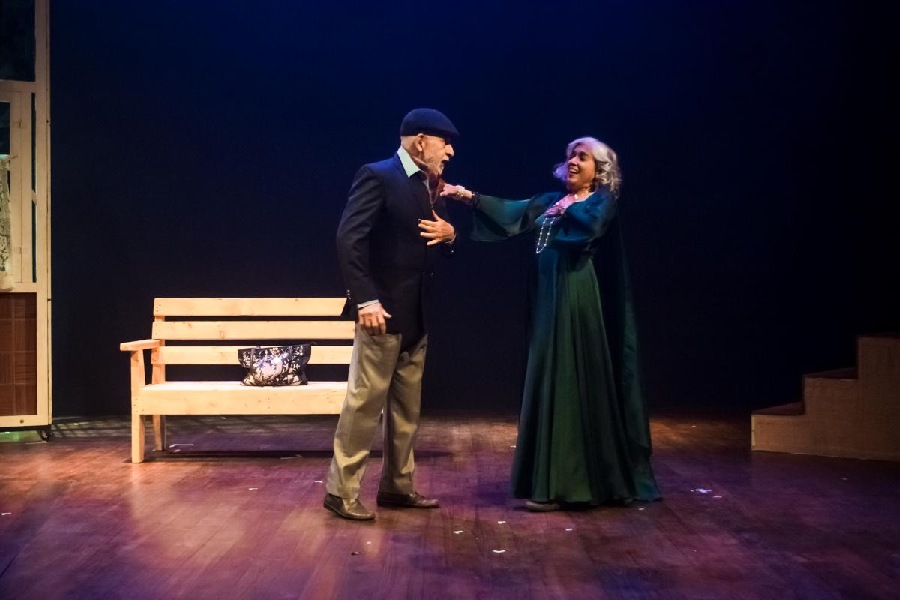He is taking a nap on a garden bench after having given up on a patient who doesn’t keep her appointment. The unapologetic patient arrives, a few hours late, nudges the doctor awake and berates him for not wearing his white coat.
Expectedly, there is an angry exchange of words. The doctor, Rashid Qureshi, pulls out a list of complaints he has received from the inmates of the sanatorium in Ranikhet — where he is the resident physician-surgeon — against the nattily-dressed, white-haired
Xenobia Sumariwala.
Xenobia shatters the quiet of the sanatorium with her loud singing at the crack of dawn, recites poetry when other patients want to sleep, and climbs out of the window at night to soak in the moonlight, noisily breaking bottles on the ledge as she does so. And that’s not all. She refuses to fill up her admission form because questions about age and marital status encroach on her privacy.
The no-nonsense Dr Qure-shi and the irrepressible Xenobia, played by Naseeruddin Shah and Ratna Pathak Shah respectively, are the lead characters of Old World, a play staged at the annual Prithvi Festival in Mumbai. Adapted from Russian playwright Aleksei Arbuzov’s play that was set in post-World War II USSR, this Arghya Lahiri-directed play is set in contemporary India.
Ignoring the outraged doctor’s rebukes, Xenobia blithely concentrates on taking pictures of trees and flowers with her mobile phone. Eventually, with Dr Qureshi pinning her down, she reveals she is 60-plus, no longer married and has interstitial lung disease. But not before declaring him to be dull and boring.
Xenobia does not just spell her name in a funny manner. She is funny in more ways than one, with her incorrigible disregard for protocol, her confident mispronunciation of words, her audacity to lecture the doctor on his health, and her propensity for breaking into song and dance.
After she leaves, despite her chirpy behaviour, the harried doctor notes in his diary, “Life has not always smiled at her; and now hardly at all.” After which he can’t help exclaiming, “What an extraordinary woman!”
Later, after a few more interactions with Qureshi, Xenobia has a similar opinion about him, “What an extraordinary man!”
The fiery exchanges between these contrasting characters create much laughter in the house, but as events unfold on stage, you realise that both, Qureshi and Xenobia, are struggling within to cope with personal losses.
Qureshi and his wife Teesta Pant were doctors in the army and she was killed by a stray shell in the 13-day 1971 Indo-Pakistan war that saw 3,000 soldiers die. Qureshi was only 26 then and he could not stomach the horrors of war. “The helplessness you feel when you can’t save a wounded man, when you see a young man die, I can’t explain what it does to you,” he tells Xenobia when they have become foes-turned-friends. “The earth trembles with every explosion, the wounded scream in agony, grown men cry like babies. It was more than I could take. So, after the war, I opted for voluntary retirement and returned to civilian life as a surgeon. War is hell, you know...”
Xenobia lost her teenage son Farzan in the 1992 communal riots of Bombay. “He just disappeared,” she tells Qureshi. “Probably his name was to blame.” She had married early, impulsively, and her marriage to an all-brawn, no-brain man hadn’t lasted very long. There were several husbands after that, but she spoke well of all of them, even the last one who had dumped her for a younger woman. Xenobia copes with disappointments by denying them and spreading cheer wherever she goes. With her sunny temperament, she even succeeds in drawing Qureshi out of his lonely shell and making him enjoy the small pleasures of life once again.
Apart from the ravages of war and violence, Old World is also about ageing — a heart-warming story about the necessity for old folks to live for themselves and live well. When Qureshi uninhibitedly, drunkenly, jives with Xenobia on the street, it is a scene to cheer!
At the end of the day, it is a feel-good story, entertainingly brought alive by the actors who always bring out the best in each other, with a talented team of light, sound, set and costume designers creating a perfect old-world charm.
With minimal props, Dhanendra Kawade sets up a pretty garden scene, a cheery café, the outside of a fine dining restaurant, an ICU and other scenes that are enhanced by appropriate lighting courtesy designer and director Lahiri. Marvin D’Souza dresses up the whacko Xenobia and sedate Qureshi in clothes that reflect their personalities, with a high point of elegance at a special dinner date. Kaizad Gherda provides an evocative sound design to a play that unfolds indoors and outdoors in different weather conditions. As Lahiri points out, “As a team, we had to support and counterpoint the journey the characters were going through, by evoking the ambience of a hill station and creating an appropriate mood for nostalgia, grief, and a process of discovering hope.”
Aleksei Arbuzov was criticised by a few of his contemporaries for creating distractingly happy worlds. But his audience loved him for precisely the same reason. You need happy stories to survive bleak times, don’t you?











